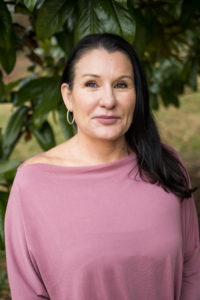 Samara Madrid Akpovo, associate professor in the Department of Child and Family Studies (CFS), teaches in the early childhood teacher preparation program. Akpovo’s research is classroom-based and utilizes ethnographic methods, discourse analysis, and interpretivist paradigms. She publishes in peer-reviewed journals focused on reconceptualist theories that employ critical, poststructuralist, postmodern, and feminist qualitative research methodologies. The central goal of these theories and methods is to challenge and deconstruct normative ways of researching and conceptualizing children, childhood, and teaching.
Samara Madrid Akpovo, associate professor in the Department of Child and Family Studies (CFS), teaches in the early childhood teacher preparation program. Akpovo’s research is classroom-based and utilizes ethnographic methods, discourse analysis, and interpretivist paradigms. She publishes in peer-reviewed journals focused on reconceptualist theories that employ critical, poststructuralist, postmodern, and feminist qualitative research methodologies. The central goal of these theories and methods is to challenge and deconstruct normative ways of researching and conceptualizing children, childhood, and teaching.
Akpovo’s research is collaborative and includes publishing with early childhood curriculum coordinators, classroom teachers, school administrators, and graduate students. Her most recent 2018 volume, Collaborative Cross-Cultural Research Methodologies in Early Care and Education Contexts, was published by Routledge Press. It was co-edited with Mary Jane Moran, professor and department head of CFS and Robyn Brookshire, director of the UT Early Learning Center. The book focuses on rich, real-life attempts to negotiate and develop culturally sensitive theoretical and conceptual frameworks, equivalent studies, and systems of relationships across distances, languages, ethics, and practices. The models presented consider the possible political and moral implications for all participants in cross-cultural research endeavors, including issues of race, colonization, immigration, and indigenous populations.
In the spring, Akpovo was awarded an Office of Community Engagement and Outreach Engagement Incentive Grant to conduct an 8-month collaborative ethnography on preschool children’s peer culture play in a Knoxville Head Start Classroom. The purpose of the 8-month collaborative ethnography is to partner with Sarah Neessen, a Head Start preschool teacher, to document and assess the daily language and literacy activities that support children’s growth and learning within their peer culture play. The research technique identifies how learning is negotiated and co-constructed in children’s play; it also identifies changes over time. Literacy, from a sociocultural perspective, conceptualizes speaking, reading, and writing as socially situated within ideological systems that inform and create children’s and teachers’ subjectivities.
The co-investigators, Akpovo and Neessen, will act as a cohesive research and instructional team as they document and support preschool children’s growth and learning in the Head Start classroom community. Head Start centers serve a specific population, not just in Tennessee, but throughout the United States. Documenting and understanding how language and literacy practices are appropriated, enacted, and used by children within their peer culture play will provide data for publications and professional development about early childhood curriculum and instruction. This project highlights Akpovo’s commitment to conducting research with teachers and children rather than on teachers and children. The research methodology, collaborative ethnography, is based on long-term, in-depth, and reciprocal partnerships where every decision, from the conceptualization of the project to dissemination of the findings, is made in conjunction with the teacher.
Akpovo’s relationship with Neessen began in spring 2018 as they worked on a practitioner article for Childhood Explorer about the extraordinary practices used in her preschool classroom. Based on that article, they decided to engage in a formal research project. The goal of this partnership is to seek further grant funding in an effort to understand the importance of community-engaged and teacher-led research in Head Start classrooms.